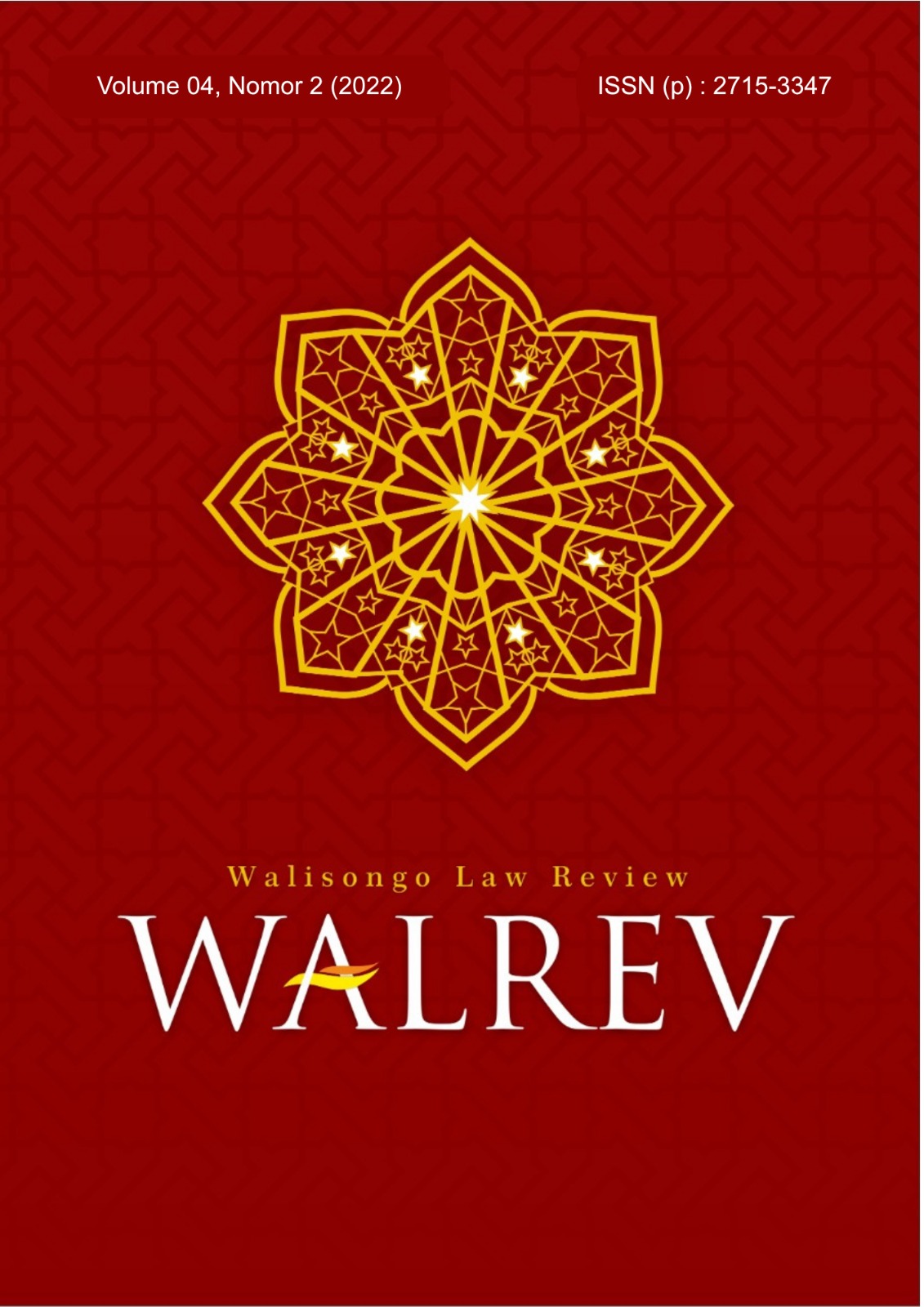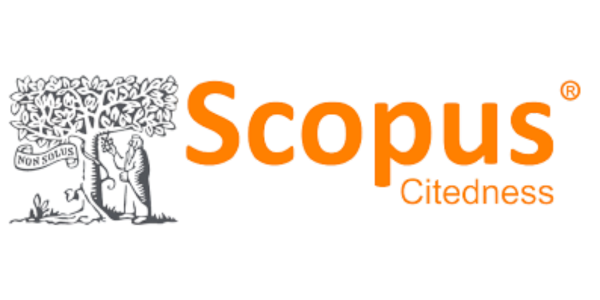The Legal Basis of Information Technology Based Cofinancing Services in Indonesia
DOI:
https://doi.org/10.21580/walrev.2022.4.2.13520Keywords:
Legal Basis, Operation of LPBBTI, Financial Services Authority, Legal ProtectionAbstract
The rapidly growing information technology-based co-financing service (LPBBTI) in Indonesia requires a forceful legal basis for the parties involved in information technology-based financial services. As a rule-of-law country, Indonesia must make the rule of law the commander in chief and guide behavior. This research seeks to find the legal basis of LPBBTI in the laws and regulations of Indonesia, which is carried out by document study and uses a statute approach. The data obtained were then analyzed qualitatively. This research did not find any legal basis for LPBBTI in the law, but there are several laws related to LPBBTI, such as the Civil Code and Law No. 11 of 2008. The legal basis for LPBBTI specifically only exists in the Financial Services Authority Regulation No. 10/POJK.05/2022 and No. 13/POJK.02/2018.
Layanan Pendanaan Bersama Berbasis Teknologi Informasi (LPBBTI) yang berkembang pesat di Indonesia memerlukan landasan hukum kuat sebagai panduan para pihak yang terlibat dalam layanan keuangan berbasis teknologi informasi tersebut. Indonesia sebagai penganut negara hukum harus menjadikan hukum sebagi panglima dan pedoman dalam bertingkah laku. Penelitian ini berusaha menemukan landasan hukum LPBBTI dalam peraturan perundang-undangan di Indonesia yang dilakukan dengan studi dokumen dan menggunakan pendekatan statute. Data yang diperoleh kemudian dianalisa secara kualitatif. Penelitian ini tidak menemukan landasan hukum LPBBTI dalam undang-undang tetapi ada beberapa undang-undang yang terkait dengan LPBBTI seperti Kitab Undang-Undang Hukum Perdata dan Undang-Undang No. 11 tahun 2008. Dasar Hukum LPBBTI terdapat dalam Peraturan Otoritas Jasa Keuangan No. 10/POJK.05/2022 dan No. 13/POJK.02/2018.
Downloads
References
Anggono, Bayu Dwi. 2018. “Tertib Jenis, Hierarki, Dan Materi Muatan Peraturan Perundang-Undangan: Permasalahan Dan Solusinya.” Masalah-Masalah Hukum 47(1):1. doi: 10.14710/mmh.47.1.2018.1-9.
Anggraeni, Ricca. 2019. “Memaknakan Fungsi Undang-Undang Dasar Secara Ideal Dalam Pembentukan Undang-Undang.” Masalah-Masalah Hukum 48(3):283. doi: 10.14710/mmh.48.3.2019.283-293.
Arner, Douglas W., Janos Nathan Barberis, and Ross P. Buckley. 2018. FinTech and RegTech in a Nutshell, and the Future in a Sandbox.
Darma, I. Made Wirya, and Putu Gede Andre Putra Jadnya. 2019. “Legal Protection of Parties in Online Credit Agreement (Peer to Peer Lending) A Case Study of PT Vcard Technology Indonesia.” Padjadjaran Jurnal Ilmu Hukum 6(3):511–32. doi: 10.22304/pjih.v6n3.a5.
Financial Services Authority. 2021. "Statistik Fintech Lending Periode September 2021". Retrieved https://www.ojk.go.id/id/kanal/ iknb/data-dan-statistik/ fintech/Pages/Statistik-Fintech-Lending-Periode-September-2021.aspx.
Financial Services Authority. 2022. "Statistik Fintech Lending Periode September 2022". Retrieved https://www.ojk.go.id/id/kanal/iknb/ data-dan-Statistik/fintech/Pages/Statistik-Fintech-Lending-Periode-September-2022.aspx.
Firmansyah, Arif. 2012. “Penafsiran Pasal 33 UUD 1945 Dalam Membangun Perekonomian Di Indonesia.” Jurnal Ilmu Hukum Syiar Hukum 13(01):264–288.
Friedman, Lawrence M. 1979. The Legal System a Social Science Perspective. New York: Russel Sage Foundation.
Gomber, Peter, Jascha Alexander Koch, and Michael Siering. 2017. “Digital Finance and FinTech: Current Research and Future Research Directions.” Journal of Business Economics 87(5):537–80. doi: 10.1007/s11573-017-0852-x.
Hazmi, Raju Moh. 2021. “Konstruksi Keadilan, Kepastian, Dan Kemanfaatan Hukum.” Res Judicata 4(1):23–45.
Hernández de Cos, Pablo. 2019. “Financial Technology: The 150-Year Revolution.” 22nd Euro Finance Week (November):1–11.
Laia, Aturkian. 2022. "Hukum Sebagai Panglima Dalam Dunia Mitos dan Politik Sebagai Raja Pada Realitasnya." Civic Society Research and Education: Jurnal Pendidikan Pancasila dan Kewarganegaraan 3(2): 1-13. Retrieved https://jurnal.uniraya.ac.id/index.php/JPKn/ article/view/575/513.
Leong, Kelvin. 2018. “FinTech (Financial Technology): What Is It and How to Use Technologies to Create Business Value in Fintech Way?” International Journal of Innovation, Management, and Technology 9(2):74–78. doi: 10.18178/ijimt.2018.9.2.791.
Moha, Mohamad Rivaldi, S. Sukarmi, and A. Kosumadara. 2020. “Urgensi Pendаftаrаn Penyelenggаrа Sistem Elektronik Bаgi Pelаku Usaha ‘ the Urgency of Electronic System Registration for e- Commerce Entrepreneurs .’” Jambura Law Review 2(02):101–19.
Noor, Afif. 2022. “Membangun Kultur Penegak Hukum Yang Berintegritas Dalam Penegakan Hukum.” ULIL ALBAB: Jurnal Ilmiah Multidisiplin 1(6):1660-1668. Retrieved http://ulilalbabinstitute.com/index.php/JIM/article/view/411/329.
Noor, Afif, Haniff Ahamat, Ismail Marzuki, Dwi Wulandari, Akhmad Arif Junaidi, Edy Lisdiyono, and Bakti Trisnawati. 2021. “Regulation and Consumer Protection of Fintech in Indonesia.” Linguistics and Culture Review 6(August 2021):49–63. DOI: 10.21744/lingcure.v6ns3.1938.
Noor, Afif, Dwi Wulandari, Haniff Ahamat, Ismail Marzuki, Akhmad Arif Junaidi, and Mahsun Mahsun. 2022. “Issues of Sharia Debt-Based Crowdfunding on Regulations in Indonesia.” Universal Journal of Accounting and Finance 10(1):298–305. DOI: 10.13189/ujaf.2022.100130.
Palit, Richard Cisanto. 2015. “Kekuatan Akta Di Bawah Tangan Sebagai Alat Bukti Di Pengadilan.” Lex Privatum 3(2): 137-145.
Patawari. 2019. Teknik Pembentukan Peraturan Perundang-Undangan. Malang: Intelegensia Media.
Resti P, and Liana, D. 2021. “Mengkaji Rencana Penerapan Pajak Pada Fintech Peer to Peer Lending.” Ekonomi dan Keuangan Budget Issue Brief 1(10):1-2
Saraswati, Retno. 2009. “Perkembangan Pengaturan Sumber Hukum Dan Tata Urutan Peraturan Perundang-Undangan Di Indonesia.” Media Hukum IX(2):48–59.
Shim, Yongwoon, and Dong Hee Shin. 2016. “Analyzing China’s Fintech Industry from the Perspective of Actor-Network Theory.” Telecommunications Policy 40(2–3):168–81. doi: 10.1016/j.telpol.2015.11.005.
Tan, David. 2021. “Metode Penelitian Hukum: Mengupas Dan Mengulas Metodologi Dalam Menyelenggarakan Penelitian Hukum.” Nusantara: Jurnal Ilmu Pengetahuan Sosial 8(8):2463–78.
Zavolokina, Liudmila, Mateusz Dolata, and Gerhard Schwabe. 2016. “FinTech - What’s in a Name?” 2016 International Conference on Information Systems, ICIS 2016 (December).
Law And Regulations
Government of the Republic of Indonesia. 2008. "Law of the Republic of Indonesia No. 11 of 2008 concerning Information and Electronic Transactions.”
Government of the Republic of Indonesia. 2011. “Law of the Republic of Indonesia No. 12 of 2011 concerning the Establishment of Legislation."
Government of the Republic of Indonesia. 2011. Law of the Republic of Indonesia No. 21 of 2011 concerning the Financial Services Authority.”
Government of the Republic of Indonesia. 1999. Law of the Republic of Indonesia No. 8 of 1999 concerning Consumer Protection.”
Government of the Republic of Indonesia. 2022. Law of the Republic of Indonesia No. 27 of 2022 concerning the Protection of Personal Data.”
Government of the Republic of Indonesia. 2019. Government Regulation No. 72 of 2019 concerning the Implementation of Electronic Systems and Transactions.”
Financial Services Authority of the Republic of Indonesia. 2022. “Regulation of the Financial Services Authority of the Republic of Indonesia No. 10/POJK.05/2022 concerning Information Technology-Based Co-Financing Services.”
Financial Services Authority of the Republic of Indonesia. 2010. “Regulation of the Financial Services Authority of the Republic of Indonesia No. 13/POJK.02/2018 Regarding Digital Financial Innovation.”










